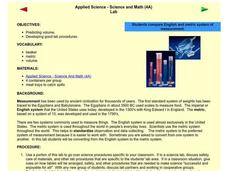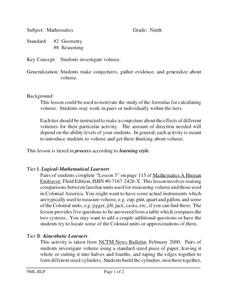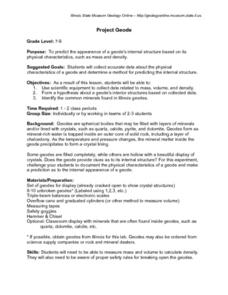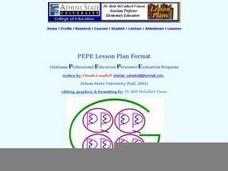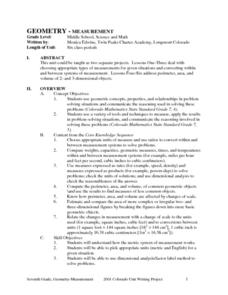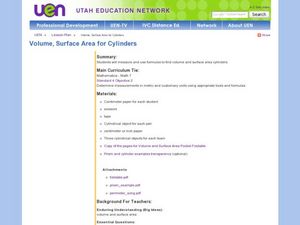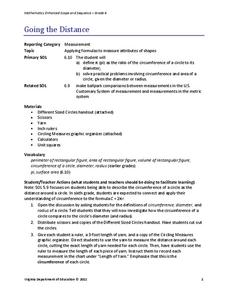Pennsylvania Department of Education
Volume of Regular and Irregular Objects
Fifth graders examine patterns and relate to equations to solve math problems. In this patterns activity, 5th graders diagram, graph, use models and use tables to solve equations for real world problems.
Curated OER
Water Pollution Lesson Plan: All Messed Up
Students map and calculate the area of the school parking lot and then the volume of water falling on the school parking lot. They map the route surface runoff will take to the nearest water body and describe the roles that human...
Curated OER
Length, Perimeter, and Area
Students explore the concepts of length, perimeter, and area. In this math lesson, students use Shape Explorer to practice finding length, perimeter, and area.
Curated OER
Applied Science - Science and Math Lab
Although it was written to use in a science class, this measurement instructional activity is adaptable to Common Core standards in math for measurement and data. Youngsters are introduced to two types of measurement systems. They...
Curated OER
Shaking Up Ice Cream
Upper graders use a variety of tools to measure liquid and solid ingredients in an ice cream making recipe. Following written and oral directions and accurately timing themselves forms the basis of this lesson.
Curated OER
Investigating Volume
Ninth graders investigate and make conjectures about volume. In this geometry lesson, 9th graders analyze data and predict the outcome. They calculate volume using different tiers.
Curated OER
Project Geode
Young geologists attempt to predict the appearnace of a geode's internal structure based on how it looks from the outside, its mass, and its physical characteristics. In this geologly lesson, learners use scientific equipment to collect...
Curated OER
Capacity and Volume
Second graders estimate capacities, compare pints and quarts, and identify pints and quarts.
Curated OER
Geometry - Measurement
Students review the procedure for determining appropriate types of measurements for given situations and measurement conversions. They figure perimeter, area, and volume of 2 and 3 dimensional objects.
Curated OER
Surface Area and Volume of a Cube
Students explore finding the surface area and volume of cubes and cylinders. They construct similar three-dimensional figures from a two-dimensional drawing. Students derive the formula for volume and surface area through examination...
Curated OER
Measurement
First graders participate in various activities dealing with measurement, length, volume, and temperature. They identify the need for standard units of measure, sort and classify objects, measure distances, and use a thermometer.
Curated OER
Volume, Surface Area for Cylinders
Seventh graders explore the concept of volume and surface area of cylinders. In this volume and surface area of cylinders lesson, 7th graders break cylinders into their base shapes of a circle and a rectangle. Students discover that...
Curated OER
Construct Figures to Find Specific Volume
Sixth graders use number cubes to explore volume of two-dimensional shapes. They roll a die and construct a shape using the numbers rolled as measurements of the sides. They estimate the volume of a given object, and then use the...
Curated OER
To Float or Not to Float - A Lesson on Density
Students define density in their own words. In this physics lesson, students calculate density using mass and volume. They explain why some objects sink and some float.
Curated OER
Length, Weight and Measures
Students complete measurement activities. In this measurement lesson plan, students watch online clips about measurements. Students view items and discuss taking measurements of them. Students discuss what units of measurement and...
Santa Monica College
The Density of Liquids and Solids
There are underwater rivers that flow on the ocean floor thanks to a difference in density. Scholars learn about the density in both liquids and solids in the second lesson of an 11-part series. They then determine the density of water,...
Curated OER
Water Alchemy
After reading "Aquatic Alchemy," an article about recapturing water for reuse when in space, your class will use calcium hydroxide or hydrated lime to purify cloudy water. Geared toward high school chemistry or environmental science...
Virginia Department of Education
Going the Distance
Estimate the value of one of the most famous irrational numbers. The hands-on lesson instructs classmates to measure the circumference and diameters of circles using yarn. The ratio of these quantities defines pi.
University of Nottingham
Drawing to Scale: A Garden
See how design and geometry go hand in hand. The activity asks learners to use geometry to design a backyard garden given dimensions of each feature. Scholars work with ratios and scale to develop an accurate scale drawing that includes...
Space Awareness
Oceans on the Rise
Temperature rises and land disappears! Through a lab exploration, learners understand the effect of temperature increase on water similar to the effect of global warming on our oceans. As they heat the water in a flask, they measure the...
Virginia Department of Education
Thermochemistry: Heat and Chemical Changes
What makes particles attract? Here, learners engage in multiple activities that fully describe colligative properties and allow the ability to critically assess the importance of these properties in daily life. Young chemists...
Virginia Department of Education
The Law of Conservation of Matter
The Law of Conservation of Matter can be complex for young scientists to fully grasp. Use this experiment to help simplify the process as pupils perform two experiments to determine mass: one that melts a substance and the other that...
NOAA
Biological Oceanographic Investigations – Signals from the Deep
The Deepwater Horizon oil spill directly impacted an area of the Gulf of Mexico the size of Oklahoma. A marine biology lesson looks at the impact of an oil spill on the deeper parts of the ocean. Scholars download actual data collected...
NOAA
Mapping the Deep-Ocean Floor
How do you create a map of the ocean floor without getting wet? Middle school oceanographers discover the process of bathymetric mapping in the third installment in a five-part series of lessons designed for seventh and eighth graders....



